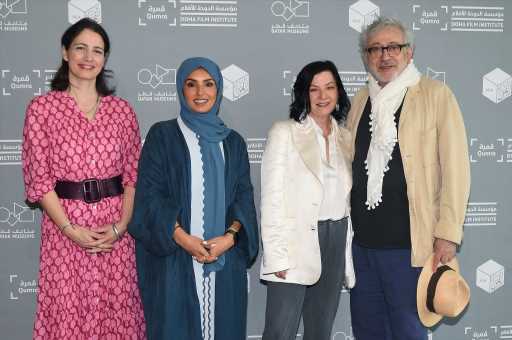The Doha Film Institute’s Qumra talent and project incubator event returned as a 100% in-person event last week, bringing participants together face-to-face in Doha for the first time since it was forced online in 2020 due to the Covid-19 pandemic.
“It’s been great to have everyone back gain. I keep pinching myself that it’s still happening. I could not be happier with how it has gone,” said DFI CEO Fatma Hassan Alremaihi.
The ninth edition, running from March 10 to 15, gathered 44 DFI grantee projects across all formats and in various stages of development and production, accompanied by their first, second and third-time directors and producers.
Related Story
Lynne Ramsay Talks Love Of Shorts, The Art Of Adaptation & Why She Has No Plans To Make A Series – Qumra Masterclass
The DFI is one of the main sources of funding for independent cinema in the Middle East and North Africa, a region with very little state support for independent film.
“We have between 400 to 500 submissions per cycle, and we have two cycles a year. It’s a lot so we try to help as many films as possible, to spread the love as much as we can,” says Hassan Alremaihi.
The Qumra selection traditionally offers a snapshot of what’s hot in MENA’s independent cinema scene.
Buzzy projects this year included Laila Abbas’s daring takedown of sexist Middle Eastern inheritance rules, Thank You For Banking With Us!, and Sara Ishaq’s drama The Station, about a woman in war-torn Yemen who supports her family with a women-only gas station. Both films are in production
As ever, there were a handful of Cannes hopefuls including Bye Bye Tiberias by Lina Soualem, exploring the legacy of her actress mother Hiam Abbass’s decision to leave her Palestinian village behind to become an actress in France, and Afef Ben Mahmoud and Khalil Benkirane’s Backstage, about a travelling theatre troupe who get lost while touring remote towns of Atlas Mountains.
Although the DFI is primarily focused on MENA region works, it also supports a handful of films from outside the region.
This year’s Qumra line-up also featured Chinese director Jianjie Lin’s Brief History Of A Family; Mongolian filmmaker Zoljargal Purevdash’s If Only I Could Hibernate, and Malaysian director Amanda Eu’s Tiger Stripes, all of which are expected to land at a festival in the coming weeks.
“You’d think after all these years, we would have covered most the countries, but we still get grantees from new places, such as Mongolia and Ethiopia this year,” said Hanaa Issa, DFI director of the film fund and programs, who is also Qumra deputy director. “This year, more than 50 countries are represented at Qumra, between the projects and industry attendees.”
She added that the quality of the projects attending Qumra has risen over the years.
“Sometimes, they also now already have sales agents attached,” she said.
DFI artistic advisor, Palestinian director Divine Intervention and It Must Be Heaven director Elia Suleiman suggested the evolving line-up reflected the changes in the regional filmmaking scene and further afield.
“In the past 10 years, many things have changed in the world of cinema. There are more new talents, different ways of looking at things, and more open ideas. It’s part of what is happening in the world of cinema in general,” he said.
In a region, where the burgeoning film festival scene is known for its glitzy red carpets and love of big-name Hollywood stars, the DFI has steered a different course with Qumra, which has won industry fans for its bespoke format and compact guest list.
The organizers also take care not to overschedule the participants so that everyone is free for the daily masterclass by one of the so-called Qumra Masters – who this year comprised directors Lynne Ramsay and Michael Winterbottom, writer Christopher Hampton, producer David Parfitt and costume designer Jacqueline West – as well as to see films in the evening and network.
It’s seen as a meeting where participants have time and space to network and do deeper, focused work on their projects with experienced industry professionals.
With the physical meetings wrapping up last Wednesday with the event’s traditional closing event in the desert, Qumra continues online this week with further one-and-one meetings.
Hassan Alremaihi emphasizes the fact that DFI support for the projects runs both before and after Qumra.
“Our relationship with the filmmakers starts from the day they get the grant, and even before we because we know most of the filmmakers from workshops we run,” she said.
“We track all the projects after Qumra and we are in continuous conversations with everybody. We know what was picked up and who is working with who. We like to track as much possible so as to learn from the results.”
With Qumra set to mark its 10th anniversary next year, Hassan Alremaihi and Issa are confident its work will continue into a second decade.
“Th ecosystem is always evolving and morphing but I think the secret has been that we’re doing it for the right reasons and that’s why we’re still around.”
Must Read Stories
Studios Say Goal Is Keeping “Production Active” As WGA-AMPTP To Start Monday

‘Shazam! Fury Of The Gods’ Falls From Heaven With $30M Opening: Here’s Why

Reviews For ‘Air’, ‘Joy Ride’ & ‘Americana’; Deadline Studio; Premieres + Parties Gallery

‘Shazam!’ Helmer David F. Sandberg’s Cinematic Influences: The Film That Lit My Fuse

Read More About:
Source: Read Full Article



